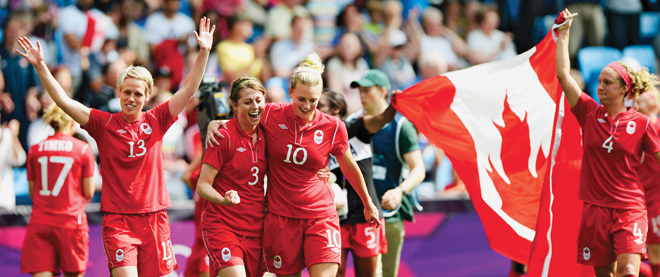Giving notice: revenge will be theirs
The Canada-U.S. match will make converts of thousands of fans
Paul Hackett/Reuters
Share

“The greatest knockout match in major-tournament football since 1982.” That was the unexpected headline of the Aug. 7 edition of the Guardian’s daily tea-time soccer column, The Fiver. The Fiver is one of those satirical newspaper entities Canada is too self-conscious to harbour, weaving outrageous lies, nonsense, running gags and unspeakable truths into a sort of cryptic crossword for the cognoscenti. But the Aug. 7 edition seems to have been written in breathless, slightly stunned earnest. The previous evening’s Olympic semifinal matchup between the Canadian and American women’s soccer teams, Fiver testified, was “the greatest knockout match in major-tournament football since West Germany beat France in the semifinal of the 1982 World Cup.”
Cheeky Fiver is always looking for excuses to deprecate the state of the first-class men’s game. But the actual joke here is that it is awfully difficult to refute their headline. Canada’s 4-3 extra-time loss to the U.S., complete with the bizarre and inexplicable referee’s ruling that helped determine the outcome, will transcend the Games of which they were a part. It should, without doubt, convert thousands of young Canadian girls to soccer, and thousands of Canadian soccer fans to the virtues of the women’s game.
Yes, those virtues are subtle. Top women’s games are short on inspired footwork and three-dimensional flourishes like bicycle kicks. But with the relative lack of artistry comes a compensating freedom from hypersensitive artist nonsense. The emphasis is on strategy, teamwork and pluck. Men who dismiss women’s sports out of hand may not be aware of this paradox: as the Canada-U.S. game showed, the “male” qualities of willpower and toughness may be more important, not less, in an environment without extreme individual talents.
Though maybe one should add “except for Christine Sinclair.” Our Sinclair scored her 141st, 142nd, and 143rd international goals against the Americans. Only the U.S.’s Mia Hamm has scored more. The last two goals in the hat trick both came off headers—Sinclair being as able as any woman in the air—but the first is especially delightful on replay, as Sinclair breaks free of U.S. defenders and fakes irascible goalkeeper Hope Solo face-first into the Old Trafford turf. Embittered Canadian fans may not want to watch the whole game over again, but that clip is a perma-keeper.
Going into the Olympics, our women’s team had a long record of futility against the American women. In the semifinal, the better-coached Canadian side gave them as much as they could handle and then some. Unable to stop the attacks of Sinclair and Melissa Tancredi, the Americans went after the 23rd man on the field. U.S. stars Abby Wambach and Alex Morgan began to berate referee Christiana Pedersen about supposed delay tactics by Canadian goalkeeper Erin McLeod, counting out loud whenever McLeod picked up the ball.
This culminated in a call that no fan, player, or coach seems able to find much precedent for in elite soccer, as played by either gender. Technically, Pedersen’s ruling is written in the game’s laws—Number 12, to be exact: “An indirect free kick is awarded to the opposing team if a goalkeeper, inside his own penalty area . . . controls the ball with his hands for more than six seconds before releasing it from his possession.” It’s a lot like baseball’s rule 8.04, which requires pitchers to pitch within 12 seconds of getting the ball back from the catcher—and which is absolutely never, ever invoked.
If an ump suddenly decided to enforce 8.04 in the seventh game of a League Championship Series, every sentient creature in the universe would find that suspicious. That is essentially what happened in the U.S.A.-Canada game. It is not even certain that Pedersen applied Law 12 properly; published referee guidelines emphasize that the indirect free kick is an extreme last resort, and that the six-second count should start late. McLeod was not clearing the ball with particular lassitude, but Pedersen, a Norwegian daycare worker, was apparently eager to keep up the pace. Instead of applying the usual remedy—cautioning McLeod with a yellow card—she awarded the U.S. a free kick. That led to a Canadian hand-ball in the box (itself a dubious call, though not as flagrantly eccentric) and a game-tying penalty kick.
Conspiracy theories are running wild on the Internet, with Canadian women’s-team followers suggesting that soccer ruling body FIFA might have encouraged field officials to help along a U.S.-Japan Olympic final. Shrewd of them, if true—but that’s not the half of it. Canada, as a nation, will now be berserk for revenge in the next big major-tournament game against the Americans (to say nothing of the Norwegians). Did we mention that the next FIFA Women’s World Cup is scheduled for 2015—in Canada?